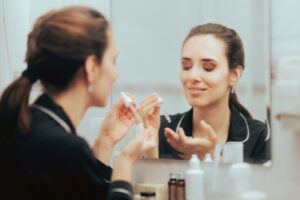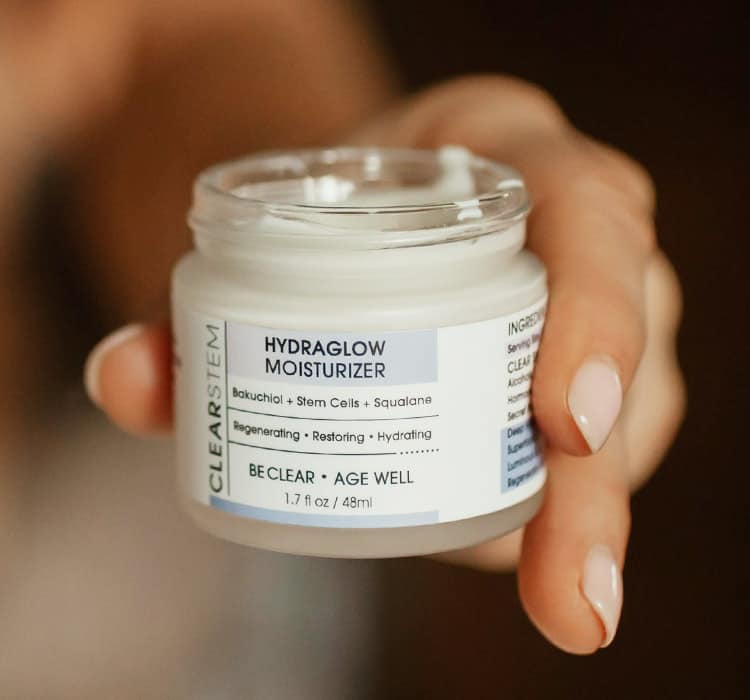Retinol, also known as vitamin A, is one of the most common ingredients in skincare products.
This includes both over-the-counter and prescription treatments. In fact, many people are surprised to learn that Accutane, Differin, Tretinion, and retinoids are all variations of vitamin A.
I’ve received multiple questions through email and the GoodGlow Facebook page about different brand name products that all contain retinol, so I decided to do a post specifically about vitamin A and its use cases.
Although my preferred strategy for clearing acne long-term is through diet and lifestyle changes (as I detail in my guide Unmasking Acne), Retinol can be used to effectively clear acne and other skin conditions in some people.
Retinol can be highly effective for certain skin conditions including acne, eczema, psoriasis, and sun damage. However, the type of retinol you use plays a huge factor in how beneficial retinol will be for your overall skin health. Saying retinol is good for your skin is far too general a statement because your skin type, the form of retinol, its concentration, and the frequency with which you use it.
To upgrade your skincare routine and add retinol for additional benefits, you need to understand the substance. Below I have a detailed guide about retinol, its perks, and potential risks for pregnant women.
What Is Retinol?
Retinol is a vitamin A derivative actively claimed to be an extraordinary skin care remedy. It is found in several beauty-enhancing products and treats acne while refining your attractive image.
Skincare commodities like anti-aging creams, anti-wrinkle lotions, moisturizers consist of an abundance of retinol. But how does retinol work?
Retinol stems from a compound called retinoid. Retinoids emerge from vitamin A with varying traits and characteristics. Although retinol is not technically an exfoliant (it is an antioxidant), it can be used to help speed up cell turnover.
One of the biggest perks of using retinol is that it increases collagen production. Collagen is a natural supplement that enhances your body in many ways. Improving heart condition, boosting muscle mass, and reducing joint pains are some of the basic examples. However, our audience’s focus should be on its most helpful advantage: preserving the youth in your skin.
Over time, collagen production reduces due to age, resulting in stretches on your skin and increased elasticity of your face, leaving wrinkle marks all over your body. Increasing the amount of collagen in your skin is one of the quickest ways to eliminate acne scars, redness, and potential skin discoloration from sun damage.
How Collagen Helps Your Skin
Retinol works by increasing the production of collagen and elastin. Unlike most beauty cures, this compound seeps into the skin to reach the middle layer, encouraging collage production alongside elastin improvement.
Moreover, retinol ensures the formation of cysts and pores is reduced by clearing dust, dead cells, and excess oil on your skin. It can also open up blocked pores and increase cell replacement to allow a fresh look on your face.
These steps minimize skin inflammation, acne scars, and pimple formation. In addition, the required balance of collagen and elastin enables your body to maintain its youthful spirit by preventing unnecessary sagging or pulling on the skin cells.
Because collagen production is so essential for clearing your skin many people actually use collagen serums as an alternative to retinol to try and stimulate collagen production.
How To Choose The Proper Retinol Dosage
While it has countless attractive benefits, it is essential to remember that retinol is a sensitive chemical that requires precision and attention. You cannot dump it on a towel and rub it on your skin. Additionally, if you want to take retinol in pill form you should start with a low dose and work your way up.
Patience is the key. Your body needs to slowly adjust to the change in the beauty regime, thus introducing the new product steadily. Initiate by utilizing retinol once a week, during nighttime.
Before you begin taking any kind of retinol you should speak with a dermatologist, especially if you are pregnant, may become pregnant, or are nursing.
Because retinol can be harsh on people with sensitive skin, and has potential complications for women who are pregnant or may be nursing, I recommend using Clearstem Skincare’s Hydraglow Stem Cell Moisturizer. Hydraglow is formulated with bakuchiol which is a natural alternative to retinol. I have very sensitive skin so I use this moisturizer almost every day for the last few months. Since I started using Hydraglow’s stem cell moisturizer I’ve recommended it to several friends and readers who have all seen positive results. If you are dealing with clogged pores or acne scarring this product is a great way to improve your skin without dealing with the common side effects of retinol. If you are interested in finding a moisturizer or any other type of skincare products I highly recommend checking out our team’s review of Clearstem Skincare. They are a high-quality brand, and multiple members of our team personally use their products.
Remember to stop using retinol immediately if you experience any of the side effects mentioned below.
Although it is completely optional I prefer to use retinol before sleep as it enhances the skin’s reaction to the sun and its harmful rays.
There is no need to apply the substance every day as you might be overdoing it and increasing your body’s tolerance. Best dosage limits to twice or thrice a week tested on small patches of your skin before proceeding with the whole face. (but always make sure to read the label of the product you are using and consult your doctor).
It is recommended to refer to your doctor or a dermatologist before modifying your skincare routine for efficient results.
Side Effects: Why You Might Hesitate
While retinol serum has been proven to be beneficial for acne and other skin conditions, we cannot ignore its unavoidable flaws. Some of these side effects fade away after a few sessions of retinol usage, while others might cause lost lasting damages.
Potential byproducts of retinol may include:
- Irritation and itchiness over the exposed areas
- Peeling of the skin
- Stinging pain and redness
- Increased sensitivity towards the sun
- Dryness of the body
- Birth defects
These are the immediate side effects of retinal application and are commonly known to fade away with regular retinol usage. They are a sign that your skin is adjusting to the new substance. Unfortunately, if they do not halt, you are required to change your healthcare regime.
People have brought some of the symptoms into experts’ knowledge after experiencing them firsthand. The most common signs of adverse reaction caused by retinol usage include itchiness and skin inflammation.
Extreme side effects are rare but possible for some users. Retinol can act up for men and women suffering from chronic skin diseases. It is known to cause rashes on eczema carrying individuals, uneven skin tones, and swelling on your skin.
Pregnant women are strongly advised against the usage of retinol. The substance is hazardous and can risk your child’s safety due to the presence of a specific retinoid. You should also avoid retinol if you plan on getting pregnant in the near future.
Remember to follow instructions when utilizing retinol as a skincare treatment. You might want to start slow, ensuring a safe journey with the product. Haste will only result in pain and excessive remedies that are just not worth it.
Everything Else Retinol Tackles
There are other beauty perks that retinol is known for. While these are not necessarily well-known, they are secret heroes working in your favor!
Other than acne, retinol can work on these other skin conditions:
- Hyperpigmentation: reduces the release of pigmentation
- Skin Discoloration: balancing skin tone and texture
- Wrinkles: decreased wrinkles and fine lines
These changes and enhancements might take time and effort to be displayed. Therefore, you need to use retinol consistently for at least three months, maintaining a steady routine.
The Final Verdict
It is safe to say that retinol is highly efficient when treating acne and other skin conditions. However, it is not advised for every user due to its list of potential side effects.
The most suitable approach is to test retinol usage on a small portion of your skin and observe the reaction. If it works, you are in for a treat! However, you may also need to slow down on the application allowing your skin to adjust to the substance before making it a permanent part of your life.
As always the best way to clear your skin long term is through your diet and nutrition, not beauty products (although there is a place for some beauty products in every skincare routine). I breakdown the nutrition plan and lifestyle changes I followed to clear my hormonal acne in my book Unmasking Acne. If you are looking for a long term solution to clear your skin and decrease inflammation you should check it out.


